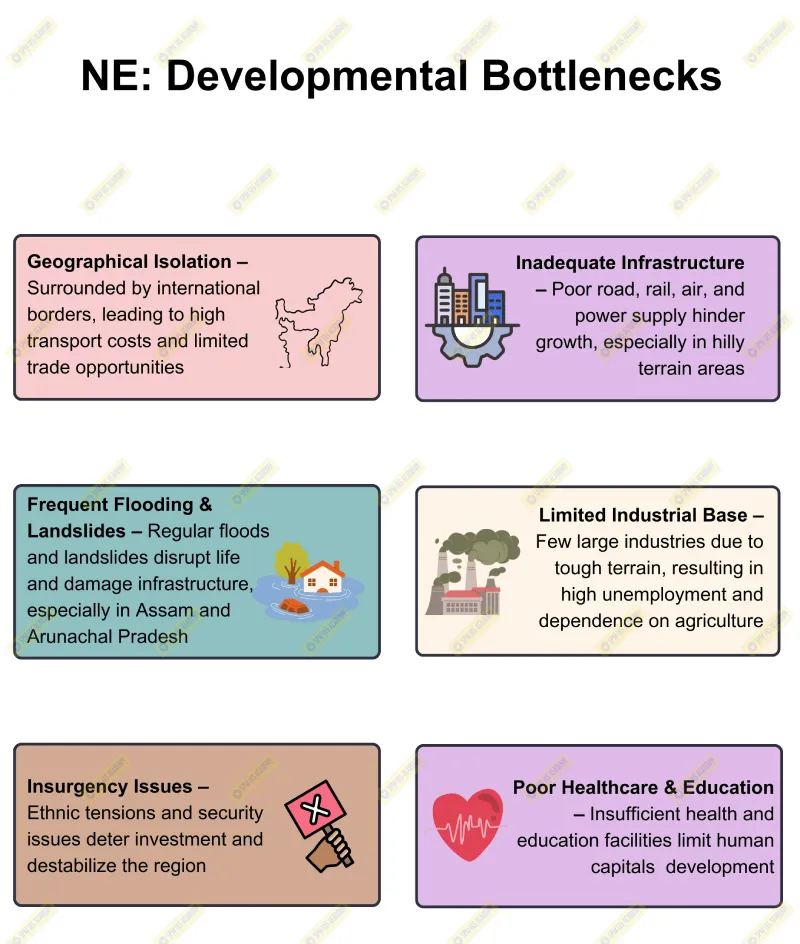Gaining access to Chittagong Port in Bangladesh presents a transformative opportunity for the economic development of North-East India. This strategic port access can enhance trade, connectivity, and regional integration for the landlocked North-East, facilitating growth across multiple sectors.
1. Enhanced Trade and Reduced Transportation Costs
- Access to Chittagong Port can shorten transportation routes for goods from the North-East to global markets, significantly lowering logistics costs and transit times. According to NITI Aayog, transportation costs in North-East India are among the highest in the country, which limits trade potential. Quicker access to a port just 200 km from Agartala will make exports competitive and attract industries to the region.
- Former Foreign Secretary Shivshankar Menon remarked that “connectivity is as important as trade itself” in boosting regional economies. Chittagong Port access supports this, facilitating smoother trade links between India, Bangladesh, and Southeast Asia.
2. Boost to Local Industries and Employment
- Access to Chittagong will bolster industries like tea, bamboo, handicrafts, textiles, and food processing, where North-East India has natural advantages. Improved export logistics can attract investment in manufacturing and agro-processing units, creating employment opportunities.
- The North East Industrial Development Scheme (NEIDS) can leverage this connectivity to draw in investors, as reduced export costs and better market access make the region more attractive for industrial growth.
3. Strengthened Act East Policy and Regional Integration
- Using Chittagong aligns with India’s Act East Policy, strengthening ties with Bangladesh, Myanmar, and ASEAN countries. This connectivity can transform North-East India into a gateway to Southeast Asia, fostering cross-border trade and cultural ties.
- External Affairs Minister Dr. S. Jaishankar stated, “the North-East is central to India’s Act East ambitions,” emphasizing that improved links with Bangladesh and Southeast Asia can stimulate economic growth for the region.
4. Development of Logistics and Infrastructure
- Chittagong Port access is encouraging major infrastructure projects like the Agartala-Akhaura rail link and upgrades to National Waterway 2 on the Brahmaputra. Improved logistics infrastructure will further reduce transit times and create a more efficient supply chain network in the region.
- Ministry of Development of North Eastern Region (DoNER) is also prioritizing projects to enhance road, rail, and inland waterway connectivity with Chittagong, aiming to turn the North-East into a logistics and trade hub.
5. Strengthening Bilateral Relations with Bangladesh
- Economic cooperation via port access strengthens India-Bangladesh ties and fosters regional stability. Increased trade and people-to-people interactions create mutual benefits, reinforcing Bangladesh’s role as a trusted partner in regional security and economic progress.
- Prime Minister Narendra Modi highlighted the importance of this cooperation, noting that “connectivity is the cornerstone of strong India-Bangladesh relations.”
Access to Chittagong Port could be a game-changer for the North-East, facilitating economic growth, improving trade routes, and integrating the region with global markets. By leveraging this connectivity, India can accelerate the North-East’s economic development, aligning with its Act East Policy and supporting sustainable regional growth.













